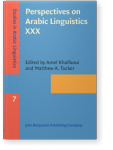Huwwa
A focus operator in Iraqi Arabic
This paper is an account of the function and interpretation of the pronominal huwwa found in a variety of clausal constructions in Iraqi Arabic. This element has received various analyses in studies on clause structure in a number of Arabic varieties. It has been considered an appositive pronominal, a copulative pronoun, a copula with pronominal features, and a Q operator. The distribution of this element in Iraqi Arabic is observed, not only in verbless equational sentences with focused elements, but also in one type of wh-questions and in yes/no questions. In all of these contexts, it is associated with a focus reading. This motivates analyzing it as an overt realization of a focus operator, with φ features valued in agreement with the focused element. As such, it should be located in the head position of the Focus Phrase, one of the functional projections constituting the discourse-functional layer of clausal architecture.
Article outline
- 1.Introduction
- 2.Iraqi Arabic constructions with huwwa
- Wh-questions
- Verbless equational clauses
- 3.The syntactic status of PRON huwwa
- 4.
huwwa as a focus operator
- 5.Yes/no questions
- 6.Conclusion
-
Notes
-
References
References (25)
References
Aoun, J., Benmamoun. E., & Choueiri, L. 2010. The syntax of Arabic. Cambridge: Cambridge University Press.
Brustad, K. 2000. The syntax of spoken Arabic. Washington, DC: Georgetown University Press.
Chomsky, N. 1995. The Minimalist Program. Cambridge, Mass: MIT Press.
Chomsky, N. 2000. Minimalist inquiries: The framework. In R. Martin, D. Michaels, & J. Uriagereka (Eds.), Step by step: Essays on Minimalist syntax in honor of Howard Lasnik (pp.89–155). Cambridge, MA: MIT Press.
Chomsky, N. 2001. Derivation by phase. In M. Kenstowicz (Ed.), Ken Hale: A life in language (pp.1–52). Cambridge, MA: MIT Press.
Choueiri, L. 2016. The pronominal copula in Arabic. Brill’s Journal of Afroasiatic Languages and
Linguistics 8, 101–135.
Den Dikken, M. 2006. Relators and linkers: The syntax of predication, predicate inversion, and copulas. Cambridge, MA: MIT Press.
Doron, E. 1986. The pronominal copula as an agreement clitic. In H. Borer (Ed.), The syntax of pronominal clitics. Syntax and Semantics 19, (pp.313–332). New York: Academic Press.
Edwards, M. 2006. Pronouns, agreement and focus in Egyptian Arabic. SOAS Working Papers in Linguistics 14, 51–62.
Eid, M. 1983. The copula function of pronouns. Lingua 59, 197–207. 

Eid, M. 1991. Verbless sentences in Arabic and Hebrew. In M. Eid & B. Comrie (Eds.), Perspectives on Arabic linguistics III: Papers from the Third Annual Symposium on Arabic Linguistics, (pp.31–61). Amsterdam & Philadelphia: Benjamins. 

Eid, M. 1992. Pronouns, questions, and agreement. In E. Broselow, M. Eid & J. McCarthy (Eds.), Perspectives on Arabic linguistics IV: Papers from the Annual Symposium on Arabic Linguistics, (pp.107–141). Amsterdam & Philadelphia: Benjamins. 

Kiss, K. É. 1998. Identificational focus versus information focus. Language 74, 245–273. 

Ouhalla, J. 1994. Focus in Standard Arabic. Linguistics in Potsdam 1, 65–92.
Ouhalla, J. 1999. Focus and Arabic clefts. In G. Rebuschi & L. Tuller (Eds.) The grammar of focus. Linguistik Aktuell 24 (pp.335–360). Amsterdam & Philadelphia: Benjamins. 

Ouhalla, J. 2004. Semitic relatives. Linguistic Inquiry 35, 288–300. 

Ouhalla, J. 2013. Agreement unified: Arabic. In L. Cheng & N. Cover (Eds.), Diagnosing syntax (pp.314–333). Oxford: Oxford University Press. 

Phillip, J. 2012. Subordinating and coordinating linkers. Ph.D. diss. University College, London.
Potsdam, E.. 2006. The cleft structure of Malagasy wh-questions. In H-M. Gartner, P. Law, & J. Sabel. (Eds.) Clause Structure and adjuncts in Austronesian languages (pp.195–232). Berlin: Mouton de Grutyer.
Rizzi, L. 1997. The fine structure of the left periphery. In L. Haegman (Ed.), Elements of grammar: Handbook of generative syntax (pp.281–337). Dordrecht: Kluwer. 

Rizzi, L. 2013. The functional structure of the sentence, and cartography. In M. den Dikken (Ed.), The Cambridge handbook of generative syntax (pp.425–457). New York: Cambridge University Press. 

Shlonsky, U. 2002. Constituent questions in Palestinian Arabic. In J. Ouhalla & U. Shlonsky (Eds.), Themes in Arabic and Hebrew syntax (pp.137–160). Dordrecht: Kluwer. 

Soltan, U. 2011. On strategies of question formation and the grammatical status of the Q-particle huwwa in Egyptian Arabic wh-questions. In L. Friedman (Ed.), University of Pennsylvania Working Papers in Linguistics 17, 215–224.
Cited by (1)
Cited by one other publication
Al-Bataineh, Hussein
2023.
The structure of wh-exclamatives in Jordanian Arabic and beyond.
Acta Linguistica Hafniensia 55:2
► pp. 216 ff.

This list is based on CrossRef data as of 29 july 2024. Please note that it may not be complete. Sources presented here have been supplied by the respective publishers.
Any errors therein should be reported to them.
